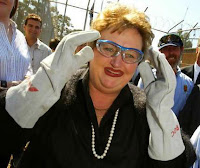state i'm in: it's amazing what you can do with spare time.
tune: the brand new heavies "you are the universe" (curtis and moore's universal summer groove).
 before christmas of last year, australia had no effective federal opposition since the ascendancy of the current government; the country was being ruled almost as if it were a one party state. john howard had a lot to stand up and cheer about.
before christmas of last year, australia had no effective federal opposition since the ascendancy of the current government; the country was being ruled almost as if it were a one party state. john howard had a lot to stand up and cheer about. the howard government was able to pass some pretty nasty and ideologically-driven legislation. the pinnacle of this came with workchoices (now re-branded as 'just-change-the-name-and-hope australian- apathy-and-complacency-means-people- won't-notice-we're-stilling-pissing-in-their-
the howard government was able to pass some pretty nasty and ideologically-driven legislation. the pinnacle of this came with workchoices (now re-branded as 'just-change-the-name-and-hope australian- apathy-and-complacency-means-people- won't-notice-we're-stilling-pissing-in-their-pockets' or something like that). championed by industrial relations minister joe hockey, the legislation saw fit to cut up into fine pieces most australian's basic workplace rights. the argument that 'no good employer' would mistreat and mishandle his worker's rights and impose conditions that would make them worse off is entirely laughable. if an employer wasn't going to be given an opportunity to strip wages and conditions from its employees, the likes of which offer the employer nothing other than more satisfied and secure workers, why would the new laws even be needed. in short, the legislation sanctions systematic violation of human rights, the likes of which have been hard fought for since before this country was even conceived. if they aren't rescinded in the near futures, they will only compound the suffering and poor health of this nation's people when the next downward global economic cycle hits... oh, that's right, that's never going to happen again.
and while we're on the subject of the basic human rights that all australians ought be afforded, let's not forget the wonderful acts of decency our foreign affairs and immigration departments have being busying themselves doing for us. but first, the australian passort:

 the excerpt closes with the request upon all nations to "afford him or her every assistance and protection of which he or she may stand in need," where "him or her" is a citizen of australia. i wouldn't suspect it could be even worth mentioning, but i presume that most basic of all legal rights, the writ of habeas corpus, ordering that a prisoner be brought before the court with expedience so that the court can determine whether that person is serving a lawful sentence, and if not, ought be released from custody, would be one of those requested elements of "every assistance and protection". clearly, other nations have not upheld our most basic of diplomatic requests, made implicit in the passport of every australian citizen travelling overseas, and i for one have not been satisfied with my own country's efforts to persuade other nations to make good on these requests.
the excerpt closes with the request upon all nations to "afford him or her every assistance and protection of which he or she may stand in need," where "him or her" is a citizen of australia. i wouldn't suspect it could be even worth mentioning, but i presume that most basic of all legal rights, the writ of habeas corpus, ordering that a prisoner be brought before the court with expedience so that the court can determine whether that person is serving a lawful sentence, and if not, ought be released from custody, would be one of those requested elements of "every assistance and protection". clearly, other nations have not upheld our most basic of diplomatic requests, made implicit in the passport of every australian citizen travelling overseas, and i for one have not been satisfied with my own country's efforts to persuade other nations to make good on these requests. but then, is it too much to ask of another nation, when australia reneges on its obligations as laid out in the united nations universal declaration of human rights, such as the "right to ...security of person"? john howard declared that those refugees that arrive in australia by their own means, not selected from specific refugee camps as one might choose a puppy from the RSPCA, and not chosen on the basis of their future ability to contribute to this nation's economy, to be "queue jumpers". in line with this view, his government enacted legislation, while refugees waited offshore on a foreign cargo vessel, to ensure that this vessel and others carrying refugees in the future could be turned away by military force, rather than by legal and evidence-based means, and that should a vessel land on an island of australia, regardless of how close to mainland, that they shall not have been deemed to have landed on australia for legal purposes. quite criminal really.
but then, is it too much to ask of another nation, when australia reneges on its obligations as laid out in the united nations universal declaration of human rights, such as the "right to ...security of person"? john howard declared that those refugees that arrive in australia by their own means, not selected from specific refugee camps as one might choose a puppy from the RSPCA, and not chosen on the basis of their future ability to contribute to this nation's economy, to be "queue jumpers". in line with this view, his government enacted legislation, while refugees waited offshore on a foreign cargo vessel, to ensure that this vessel and others carrying refugees in the future could be turned away by military force, rather than by legal and evidence-based means, and that should a vessel land on an island of australia, regardless of how close to mainland, that they shall not have been deemed to have landed on australia for legal purposes. quite criminal really. on the economy, very little has changed. expenses have been cut (not necessarily a good thing when one considers from where they have been cut) and revenues have increased (through frequently unpopular means read GST and oil excise). our superannuation system has been improved, which is more than welcome, however the tax system has not been streamlined as it ought to have been. the means of creating workplace flexibility have been carried out with ideological zeal, as aforementioned, rather than with a fair approach of making the workplace mobile through training and education, able to adapt to a changing global economy. a state government initiative is one of the few recently put into practice that is actively seeking to address skill shortages in target demographics, in this instance, older workers.
on the economy, very little has changed. expenses have been cut (not necessarily a good thing when one considers from where they have been cut) and revenues have increased (through frequently unpopular means read GST and oil excise). our superannuation system has been improved, which is more than welcome, however the tax system has not been streamlined as it ought to have been. the means of creating workplace flexibility have been carried out with ideological zeal, as aforementioned, rather than with a fair approach of making the workplace mobile through training and education, able to adapt to a changing global economy. a state government initiative is one of the few recently put into practice that is actively seeking to address skill shortages in target demographics, in this instance, older workers. this government continues to remove and reduce tariffs from developing countries, a measure which i wholeheartedly support, although this is not being offset with measures to ensure our workforce can easily move into other trades and professions, as the ones which once made up our core move offshore. in fact, it is not being offset at all, as funding to training and education decreases, forcing tertiary institutions to seek more and more full-fee international and domestic places, educating professionals for other economies. there is no harm in having our cities playing host to the youth of other nations, for this enriches all through social contact, a safer more populated CBD environment, and some bloody good cheap food. designated schools for international students, such as those specialising in english language education should be allowed to flourish and expand as they see fit. however, caps need to be in place for our tertiary institutions, ensuring that domestic need for educated professionals is met, and domestic full-fee paying students ought not exist at all, or one must question a university education's worth. adequate funding could address this.
this government continues to remove and reduce tariffs from developing countries, a measure which i wholeheartedly support, although this is not being offset with measures to ensure our workforce can easily move into other trades and professions, as the ones which once made up our core move offshore. in fact, it is not being offset at all, as funding to training and education decreases, forcing tertiary institutions to seek more and more full-fee international and domestic places, educating professionals for other economies. there is no harm in having our cities playing host to the youth of other nations, for this enriches all through social contact, a safer more populated CBD environment, and some bloody good cheap food. designated schools for international students, such as those specialising in english language education should be allowed to flourish and expand as they see fit. however, caps need to be in place for our tertiary institutions, ensuring that domestic need for educated professionals is met, and domestic full-fee paying students ought not exist at all, or one must question a university education's worth. adequate funding could address this. and let's not even mention issues of the environment - we can leave the CSIRO and sir howard stern to adequately explain a due course of action. but can we leave it to mr howard now that he claims to believe that climate change is indeed a phenomenon worth investigating? his awareness of the importance of such an issue cannot be judged to be acute. one also wonders whether or not any response will be genuine and not just a cloak concealing motivations of short-term electoral gain and ideology.
and let's not even mention issues of the environment - we can leave the CSIRO and sir howard stern to adequately explain a due course of action. but can we leave it to mr howard now that he claims to believe that climate change is indeed a phenomenon worth investigating? his awareness of the importance of such an issue cannot be judged to be acute. one also wonders whether or not any response will be genuine and not just a cloak concealing motivations of short-term electoral gain and ideology. so mr howard has had his cakewalk for the past ten years. and then in rides kevin rudd. how refreshing it is to have someone who is willing and able to hold the government, at least publicly, accountable. all of a sudden, there are a range of issues on the public agenda, and for a moment it seems the public is even engaged. we may now get a broadband network across almost 100% of the australian population some time in the next few years thanks to badgering from mr rudd. there has been a focus on education and training. for the first time in eleven years, the federal budget saw fit to increase funding for universities and technical colleges, and reforms and a national curriculum for primary and secondary schools is firmly on the agenda, rather than just being a couple of terms that have been bandied around for the last few years.
so mr howard has had his cakewalk for the past ten years. and then in rides kevin rudd. how refreshing it is to have someone who is willing and able to hold the government, at least publicly, accountable. all of a sudden, there are a range of issues on the public agenda, and for a moment it seems the public is even engaged. we may now get a broadband network across almost 100% of the australian population some time in the next few years thanks to badgering from mr rudd. there has been a focus on education and training. for the first time in eleven years, the federal budget saw fit to increase funding for universities and technical colleges, and reforms and a national curriculum for primary and secondary schools is firmly on the agenda, rather than just being a couple of terms that have been bandied around for the last few years. more than any other issue, industrial relations may polarise the decision of many voters on polling day, as workchoices legislation may actually make a difference to the hip pocket of many australians and their families. with the aid of deputy julia gillard (who's hair and clothes seem to get a disproportionate amount of media attention, compared with say, any other politicians'), mr rudd is taking this issue and placing it fairly in the centre of the public arena and has already pressed the government to reverse some elements of the laws, making them a little fairer, but more cumbersome and worthless. it would be nice if these laws were rescinded entirely, and i am quite sure a change of government would see this happen.
more than any other issue, industrial relations may polarise the decision of many voters on polling day, as workchoices legislation may actually make a difference to the hip pocket of many australians and their families. with the aid of deputy julia gillard (who's hair and clothes seem to get a disproportionate amount of media attention, compared with say, any other politicians'), mr rudd is taking this issue and placing it fairly in the centre of the public arena and has already pressed the government to reverse some elements of the laws, making them a little fairer, but more cumbersome and worthless. it would be nice if these laws were rescinded entirely, and i am quite sure a change of government would see this happen. for the first time since the 1990s, concerns of the environment are now on the agenda. there are councils and round-table meetings reporting all the time on the economic outcomes of action or no action, and real practical measures such as carbon trading schemes have been proposed (although will business benefit primarily as has happened in europe). again, this must be attributed to having an opposition willing to take an issue that is of genuine concern to the future of the people and have it debated in the public arena. having someone credible in the post of pursuing this aim, such as peter garrett, is certainly beneficial, however i believe it likely that mr garrett may become something of a liability later in the year when issues surrounding uranium mining and utilisation come to the fore.
for the first time since the 1990s, concerns of the environment are now on the agenda. there are councils and round-table meetings reporting all the time on the economic outcomes of action or no action, and real practical measures such as carbon trading schemes have been proposed (although will business benefit primarily as has happened in europe). again, this must be attributed to having an opposition willing to take an issue that is of genuine concern to the future of the people and have it debated in the public arena. having someone credible in the post of pursuing this aim, such as peter garrett, is certainly beneficial, however i believe it likely that mr garrett may become something of a liability later in the year when issues surrounding uranium mining and utilisation come to the fore.so what will happen in the coming months before the election. i have no firm predictions, although at least the australian political landscape is now worth observing, and is likely to become increasingly engaging of the australian people throughout the year. at this point, i still suspect a coalition victory come election time, at least this time round. polling is good for the ALP right now, but if one scratches beneath the surface of the polls, one finds that the actual questions within the poll that tend to polarise a voters mind, and send them in one or another direction toward a vote, mr rudd is lagging. these include the public impression of him as not having a firm handle on skills in economic management, and strong leadership. mr howard however is lagging in the fundamental area that he is no longer open to ideas. so, for now, the jury is still out.
we'll see what time brings, but at the moment, things are looking at least a few degrees up.
what only makes things sweeter is that it looks as though paul keating may decide to throw himself back into the fray a little more often. aside from being the greatest economic reformer, and attempts at being the greatest social reformer, this country has ever seen, he's a bloody colourful character. the australian public arena is invariably richer for his comments, regardless of who is on the pointy end.
fun times with dr john hewson
singing show tunes to bob downe


No comments:
Post a Comment